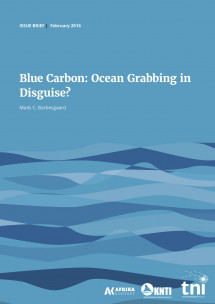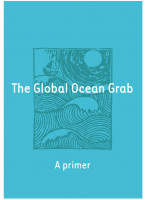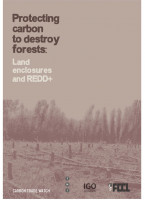Blue Carbon: Ocean Grabbing in Disguise?
Will blue carbon projects have similar consequences for coastal communities as the negative socio-ecological impact from the market-based mitigation efforts on land (REDD-ii)

Downloads
Authors
While the global rush to control land resources is well established, similar ‘power-grabs’ in relation to aquatic resources are less well-known and researched. Through on-going collaborative work between representatives of fisher peoples’ movements, scholar-activists and social justice organisations such processes have recently been coined as ‘ocean grabbing’.
Increasingly, conservation efforts that purportedly align the needs of the poor, profit interests and environmental concerns are one of the main processes through which ocean grabbing takes place. In recent years, different global policy processes have stressed the need for ‘valuation’ of aquatic resources as a tool to unlock their ‘blue-growth’ potential and simultaneously preserve them. Such policy proposals, effectively opening up for widespread commodification, are being advocated as the only sustainable response to the increasingly dire straits of the aquatic and coastal ecosystems. Coupled with this broader process of ‘selling nature to save it’, valuation efforts that also take the carbon storage and capture abilities of coastal ecosystems into account are increasingly being pushed as a crucial tool to fight the climate crisis.
In tune with broader emphasis on market-based solutions, under the rubric of ‘blue carbon’ a burgeoning alliance of international environmental NGOs, the private sector and a number of governments have begun advocating for the inclusion of coastal ecosystems into carbon markets. Most recently, at a side-event to the UNFCCC meeting in Paris, the ‘International Partnership for Blue Carbon’ was launched.
While proponents guarantee sustainable outcomes, similar market-based mitigation efforts on land (REDD+ii) have had huge negative socio-ecological consequences for communities on the ground. Will blue carbon projects have similar consequences for coastal communities? This short brief seeks to start a critical debate on the issue.



